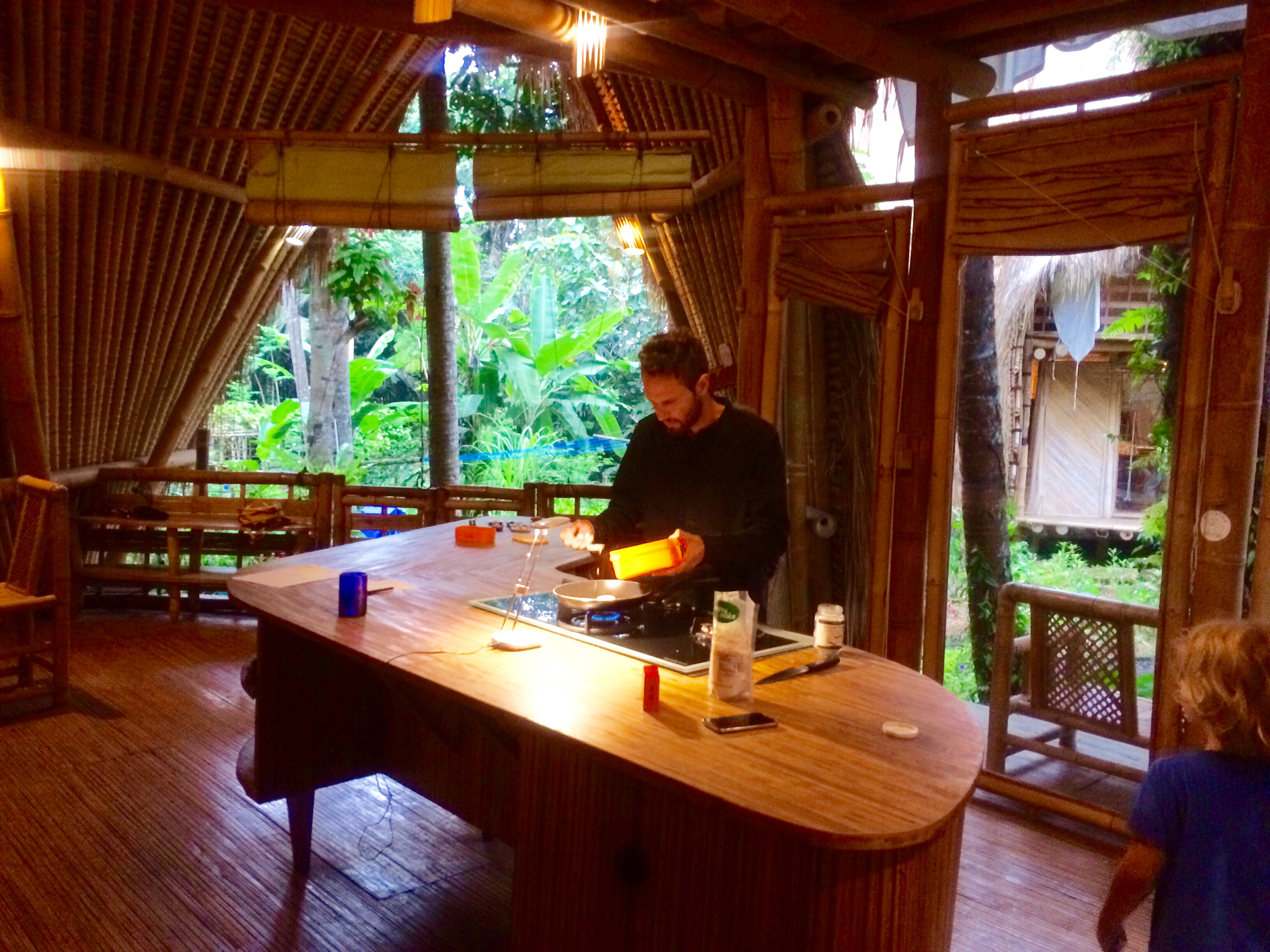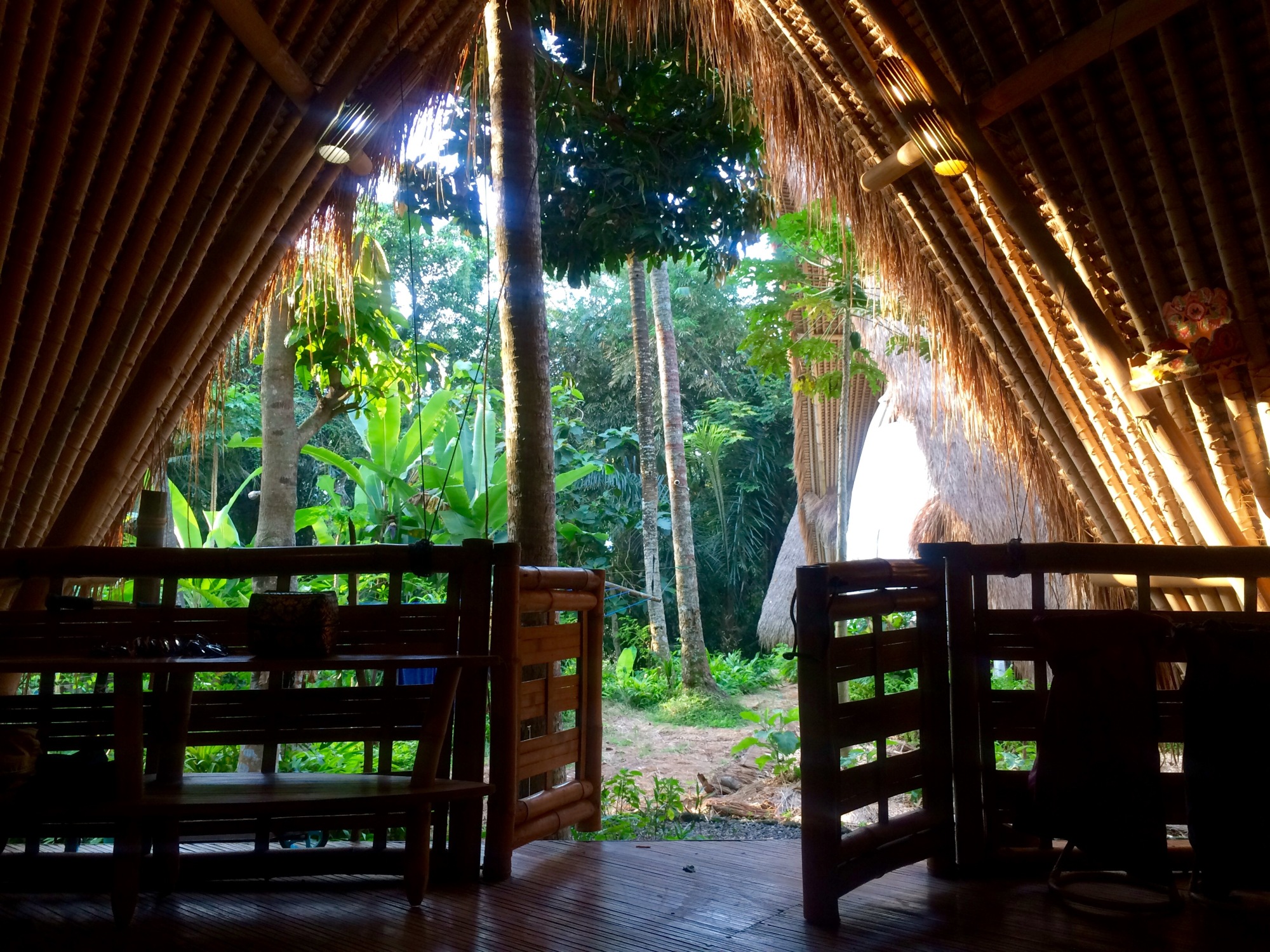After moving to our jungle house I find myself in a place where consumption – and most certainly – overconsumption of anything but food is virtually impossible. And this is actually a very interesting experience for several reasons. When we first moved into the house, I felt like we were missing many things; like nice looking cups and vases for flowers, lamps and a pile of extra towels. But, as the days and weeks have gone by, and we haven’t been able to find anything, I suddenly don’t really feel like we are missing much anymore. The cups that came with the house are actually ok, I have decorated some milk bottles and jars and am using them as vases, the towels we have can be washed easily at the local laundry, and I bought a couple of nice candles in jars for the evenings. In other words; I have experienced that if I wait a bit before just going into consumption-mode, the need to consume generally disappears, or I get creative and create my own solutions with whatever I have handy.

Consumption – or minimal consumption or well-informed consumption – can be a non-violent way of protesting against mindless overconsumption, unethical production methods, and the insignificance and poor quality of the majority of the products we surround ourselves with.
In American essayist and philosopher Henry David Thoreau’s Civil Disobedience from 1849, Thoreau argues that change must come from the individual; if there is something in the society within we live that we don’t agree with or that goes against our moral fundament, we must protest.
The essay is a defence for the individual’s right (and duty!) to act based on moral values, even though these are in opposition to the demands of society or of the government. Thoreau was put in jail after refusing to pay his taxes as a protest to slavery, as he was determined to advocate respect for each individual and for individual freedom. In the essay on Civil Disobedience, he argues that community taxes supporting highways and schools are ethical, but contrarily those supporting unjust war and enslavement are not. And he continues by saying that we should be men first and subjects afterwards and cultivate respect for the right rather than for the law. If not, why are we equipped with a conscience?
“…when an acorn and a chestnut fall side by side, the one does not remain inert to make way for the other, but both obey their own laws, and spring and grow and flourish as best they can, till one, perchance, overshadows the other. If a plant cannot live accordingly to its nature, it dies; and so a man.”
Having a conscience is a part of our nature, and thus, living in opposition to what we deep down know is right, is fundamentally living against our nature.
Thoreau is an example of a man that deliberately takes responsibility, makes conscious choices and faces the consequences. We all have an obligation to revolt against injustice and to not to give unfairness and discrimination our practical support. But of course, non-violent protesting requires that we have a moral fundament. That we have standards and value, by which we live. That we have reflected upon right and wrong, and that we have made choices as to what we believe in.
Thoreau had seen though the assumption people in his era lived by (i.e. that slavery is normal and acceptable), and he had decided that the only natural and right thing to do was to revolt against this. But what if we are governed by equally as unethical and absurd assumptions in our time era and culture as people were in late 1900’s America when believing that slavery was ok? What if decades from now, people will look back at our time and think: I can’t believe that people actually just accepted this! I can’t believe that they did nothing!
It is important to be critical of the assumptions that control the way we live. I am sure that most of us would agree that slavery is wrong, but people at Thoreau’s time didn’t question it. Why not? Because they were evil or bad people? No, the only reason why most people didn’t react against slavery back then was simply because they weren’t reflecting upon it or questioning the governing societal and cultural assumptions. And this is exactly why reflecting upon and questioning the norms and the “this is just the way it is”s of a time era and culture is so incredibly important. As well as to teach our children to do so!
Just because something is the norm doesn’t mean that it is right.

An example of the diverse educational environment of the Green School
I recently sent my friend and old neighbour in Copenhagen, Sven, a photo (along with a bunch of other photos) of a cock fight we suddenly found ourselves in the middle of whilst exploring the surroundings of Ubud. I sent the photos to him along with some comment on local culture and customs. He replied like this (translated from Danish):
“Well, maybe the latter is an expression of local culture, but as far as I am concerned nevertheless a somewhat suspicious one of the kind. When one has practiced bad habits for a long while they are automatically transformed into the more guiltless phenomenon culture. But is it not our so-called culture that is the cause of our global climate changes and that macro and microplastics are displacing the diverse wildlife of our oceans? Absolutely.”
And, I couldn’t agree more.
What if it is time for some Thoreauian civil disobedience in the form of non-violent protesting against over-consumption, climate changes, pollution and the suppression and exploration of workers in the manufacturing industry (as well as service industry for that matter) and animals? What if future generations will be shocked that no one reacted on the obvious injustice that our capitalistic late-modern society is based upon, and the astounding speed with which our climate is changing?
How do we cultivate respect for the right rather than for the law and the commonly accepted assumptions?

Great, inspiring column again, Kristine! It’s so recognizable, how waiting and reflecting can help you take a more conscious and long term decision. I’ve experienced this many times during the past 8 months. Also, I believe that we’ve become so used to just being able to solve a challenge immediately or to give into a desire instantly, that we’ve forgotten to pause, reflect, think and reconsider. We’re the victims of our own institutionalized short termism and impatience…
I like the connection you make to civil disobedience. It made me think of this story a friend recently told me: across several countries there’s this civil disobedience movement happening with regard to consumption and waste: in the supermarkets people are unpacking their purchases and leaving the unnecessary packaging behind in the stores. As a message to the supermarkets and to the producing industries that they should stop with all the useless packaging. I believe these actions are called plastic attacks. Shifts are happening; we slowly but surely start to question ourselves, which is exactly what is needed.
LikeLiked by 1 person
Amazing – I love the plastic attacks! Thank you for your thoughts, Margot!
LikeLike
I am wondering whether the difficulty here is that there are so many issues that we need to confront- eg animal rights/pollution/waste management/inequality/conflict/etcetc so yes we can imagine a later moment in time where people will say ‘you actually killed animals to EAT?!’ ‘You poured plastics into the ocean? You thought etc but there seem to be so many things we are doing wrong that it hard to know which battle to fight first. Agree absolutely that one’s own standards of behaviour are the start (cultivate your own garden). Lots of food for thought. Thank you for this:)
LikeLiked by 1 person
Yes, there are indeed so many things that one could rethink that it can feel unmanageable. But I believe that every little thing we do in accordance with our moral fundament is a step in the right direction. Thank you for your comment!
LikeLike